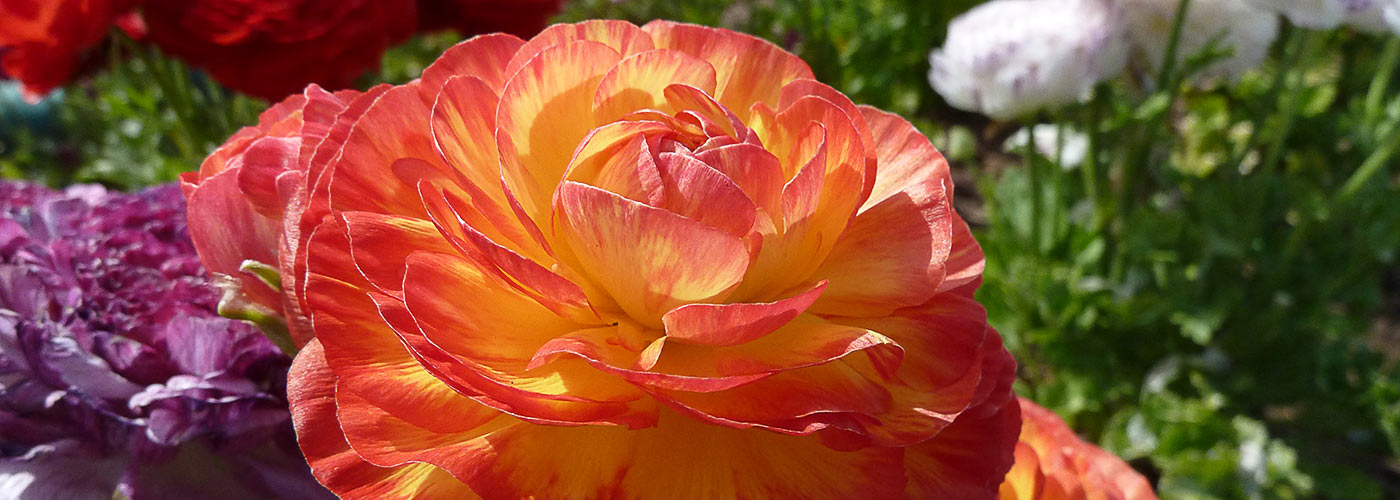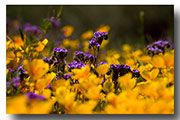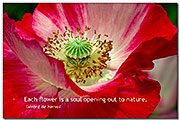Quotes about Flowers

I hold no preference among flowers, so long as they are wild, free, spontaneous.
Edward Abbey (1927-1989) – Desert Solitaire “Cliffrose and Bayonets”, p. 25 (1968)
Gallery of Nature Quotes
Wild roses are fairest, and nature a better gardener than art.
Louisa May Alcott (1832-1888) – A Long Fatal Love Chase, 1866, Dell Publishing reprint, 1995, p 11.
Flowers are God’s thoughts of beauty taking form to gladden mortal gaze.
Anon
What a desolate place would be a world without a flower! It would be a face without a smile, a feast without a welcome. Are not flowers the stars of the earth, and are not our stars the flowers of heaven?
Mrs. Clara Lucas Balfour (1808-1878) – Quoted in New Cyclopædia of Prose Illustrations: Embracing allegories, analogies …ed. Elon Foster, Funk & Wagnalls, NY, 1877, p. 350.
The breath of flowers is far sweeter in the air than in the hand.
Sir Francis Bacon (1561-1626) – Essays, “Of Gardens,” 1627
Flowers are the sweetest thing that God ever made, and forgot to put a soul into.
Henry Ward Beecher (1813-1887) – Life Thoughts , Gathered from the Extemporaneous Discourses of Henry Ward Beecher, 1858, p. 234
Flowers may beckon towards us, but they speak toward heaven and God.
Henry Ward Beecher (1813-1887) – Quoted in Forty thousand quotations, prose and poetical: ed C. Douglas, Harrap & Co, London, 1904, p. 741
Flowers have an expression of countenance as much as men or animals. Some seem to smile; some have a sad expression; some are pensive and diffident; others are plain, honest and upright, like the broad faced sunflower and the hollyhock.
Henry Ward Beecher (1813-1887) -Henry Ward Beecher (1813-1887) – Star Papers, or Experiences of Art and Nature, “A Discourse of Flowers,” Beecher, J. C. Derby, NY, 1855, p.100.
The thistle is a prince. Let any man that has an eye for beauty take a view of the whole plant, and where will he see a more expressive grace and symmetry; and where is there a more kingly flower?
Henry Ward Beecher (1813-1887) – Henry Ward Beecher (1813-1887) – Star Papers, or Experiences of Art and Nature, “A Discourse of Flowers,” Beecher, J. C. Derby, NY, 1855, p 96.
Nothing can be more airy and beautiful than the transparent seed-globe—a fairy dome of splendid architecture.
Henry Ward Beecher (1813-1887) -Henry Ward Beecher (1813-1887) – Star Papers, or Experiences of Art and Nature, “A Discourse of Flowers,” Beecher, J. C. Derby, NY, 1855, p98.
The tree is but a huge boquet.
Henry Ward Beecher (1813-1887) – Henry Ward Beecher (1813-1887) – Star Papers, or Experiences of Art and Nature, “A Discourse of Flowers,” Beecher, J. C. Derby, NY, 1855, p .99.
He who only does not appreciate floral beauty is to be pitied like any other man who is born imperfect. It is a misfortune not unlike blindness.
Henry Ward Beecher (1813-1887) – Star Papers, or Experiences of Art and Nature, “A Discourse of Flowers,” Beecher, J. C. Derby, NY, 1855, p 94.
A very common flower adds generosity to beauty. It gives joy to the poor, to the rude, and to the multitudes who could have no flowers were nature to charge a price for her blossoms.
Henry Ward Beecher (1813-1887) – Star Papers, or Experiences of Art and Nature, “A Discourse of Flowers,” Beecher, J. C. Derby, NY, 1855, p. 94.
Flowers always make people better, happier, and more helpful; they are sunshine, food and medicine for the soul.
Luther Burbank (1849-1926) – Extracts from a paper read by Mr. Luther Burbank before the California Academy of Sciences, quoted in The Rural Californian, XXIV, November, 1901, N 11, p. 422.
Autumn is a second Spring when every leaf is a flower.
“L’automne est un deuxième printemps où chaque feuille est une fleur.” Bibliothèque nationale de France, L’Été, p. 87
Albert Camus (1913-1960) – As quoted in Visions from Earth (2004) by James R. Miller, p. 126,
I held a blue flower in my hand, probably a wild aster, wondering what its name was, and then thought that human names for natural things are superfluous. Nature herself does not name them. The important thing is to know this flower, look at its color until the blueness becomes as real as a keynote of music. Look at the exquisite yellow flowerettes at the center, become very small with them. Be the flower, be the trees, the blowing grasses. Fly with the birds, jump with a squirrel!
Sally Carrighar (1898-1985) Home to the Wilderness, Houghton Mifflin, 1973, p96
Nature, exerting an unwearied power,
Forms, opens, and gives scent to every flower;
Spreads the fresh verdure of the field, and leads
The dancing Naiads through the dewy meads.
William Cowper (1731-1800) – Table Talk. Line 690.
(Naiads = Greek Mythology – a type of nymph who presided over fountains, wells, springs, streams, and brooks; meads = meadow)
The flowers are Nature’s jewels, with whose wealth she decks her summer beauty.
George Croly (1780-1860) – The poetical works of the Rev. George Croly, Vol I, London, 1830, 287.
The earth laughs in flowers.
Ralph Waldo Emerson (1803-1882) – “Hamatreya,” in The Complete Works of Ralph Waldo Emerson, (1903-1904)
Many eyes go through the meadow, but few see the flowers in it.
Ralph Waldo Emerson (1803-1882) Journal entry, May 16, 1834
Flowers . . . are a proud assertion that a ray of beauty outvalues all the utilities of the world.
Ralph Waldo Emerson (1803-1882) – “Gifts,” in Essays: Second Series (1884)
Flowers and fruits are always fit presents; flowers because they are a proud assertion that a ray of beauty outvalues all the utilities of the world.
Ralph Waldo Emerson (1803-1882) – Essay, “Gifts” (1844)
There are all kinds of interesting questions that come from a knowledge of science, which only adds to the excitement and mystery and awe of a flower.
Richard Feynman (1918-1988) – What Do You Care What Other People Think? (1988)
The flower is the poetry of reproduction. It is an example of the eternal seductiveness of life.
Jean Giraudoux (1882-1944) – The Enchanted, A Comedy in Three Acts, Act 1 (Daisy to Inspector), 1933.
The Amen! of Nature is always a flower.
Oliver Wendell Holmes (1809-1894) – The Autocrat of the Breakfast-table, Ch X, p255, J.M. Dent & Co, Boston, MA, 1907
Doubtless botany has its value; but the flowers knew how to preach divinity before men knew how to dissect and botanize them; they are apt to stop preaching, though, so soon as we begin to dissect and botanize them.
Henry Norman Hudson (1814-1886) – Forty Thousand Quotations: Prose and Poetical, C.N. Douglas, comp, 1917.
The penny — the ill-spared penny — for it would buy a wheaten roll — the poor housewife pays for a root of prim rose, is her offering to the hopeful loveliness of nature; is her testimony of the soul struggling with the blighting, crushing circumstance of sordid earth, and sometimes yearning towards earth’s sweetest aspects. Amidst the violence, the coarseness, and the suffering that may sur round and defile the wretched, there must be moments when the heart escapes, craving for the innocent and lovely ; when the soul makes for itself, even of a flower, a comfort and a refuge.
Douglas Jerrold (1803-1857) – Specimens of Douglas Jerrold’s Wit, ed Blanchard Jerrold, 3rd ed, Ticknor and Fields, 1859, p. 132.
Flowers in the city are like lipstick on a woman—it just makes you look better to have a little color.
Lady Bird Johnson (1912-2007) – Quoted in Secret lives of the First Ladies, Cormac O’Brien, Quirk books, Philadelphia, PA, 2005, p. 226.
Some people grumble because roses have thorns. I am thankful that thorns have roses.
Jean-Baptiste Alphonse Karr (1808-1890 ) – Quoted in The Entering Wedge: William Kennedy Marshall, Jennings and Graham, 1904, p. 52.
I feel the delightful, velvety texture of a flower, and discover its remarkable convolutions; and something of the miracle of Nature is revealed to me.
Helen Keller (1880-1968) – “Three Days to See,” January, 1933, The American Idea: The Best of the Atlantic Monthly
Flowers always have it — poise, completion, fulfillment, perfection . . .
Anne Morrow Lindbergh (1906-2001) – Bring Me a Unicorn: Diaries and Letters of Anne Morrow Lindbergh, 1922-1928 (1971)
“Le Pappillon est une fleur qui vole,
La fleur un papillon fixe.”
The butterfly is a flying flower,
The flower a tethered butterfly.”
Ponce Denis Ecouchard Lebrun (1729-1807) – Thomas Benfield Harbottle and CL Philip Hugh Dalbiac, Dictionary of Quotations, (French) Swan Sonnenschein & Co, 1908, p. 131
The universe is one great kindergarten for man. Everything that exists has brought with it its own peculiar lesson. The mountain teaches stability and grandeur; the ocean immensity and change. Forests, lakes, and rivers, clouds and winds, stars and flowers, stupendous glaciers and crystal snowflakes – every form of animate or inanimate existence, leaves its impress upon the soul of man.
Orison Swett Marden (1850-1924) Rising in the World; or Architects of Fate, The Success Company, NY, 1895, p.424
Bring me with your hands that flower
which yearns
Up to the ultimate transparent white
Where all of life into its essence burns:
Bring me that flower impassioned of the light.
Portami tu la pianta che conduce
dove sorgono bionde trasparenze
e vapora la vita quale essenza;
portami il girasole impazzito di luce.
Eugenio Montale (1896-1981) – “Bring me the Sunflower,” Selected poems By Eugenio Montale, New Direction Books, 1965, p. 15. (There are many variant translations, search for Bring me the Sunflower)
People from a planet without flowers would think we must be mad with joy the whole time to have such things about us.
Iris Murdoch (1919-1999) – A Fairly Honorable Defeat, Part 1, Chapter 15, (2001) p 170, 1970.
Each flower is a soul blossoming out to nature. Chaque fleur est une âme à la nature éclose.
Gérard de Nerval (1808-1855) – A French Poem: Les vers dorés (The Golden Lines) (1854) , Quoted in A Dictionary of Foreign Quotations, McMillan, 1980 p. 121
Gallery of Nature Quotes
We believe that we know something about the things themselves when we speak of trees, colors, snow, and flowers; and yet we possess nothing but metaphors for things — metaphors which correspond in no way to the original entities.
Friedrich Nietzsche (1844-1900) – On Truth and Lie in an Extra-Moral Sense (1873 ) Über Wahrheit und Lüge im außermoralischen Sinn
Nobody sees a flower really; it is so small. We haven’t time, and to see takes time – like to have a friend takes time.
Georgia O’Keffe (1887-1986) – Contribution (1939) to the exhibition catalogue An American place (1944)
When you take a flower in your hand and really look at it, it’s your world for the moment. I want to give that world to someone else. Most people in the city rush around so, they have no time to look at a flower. I want them to see it whether they want to or not.
Georgia O’Keffe (1887-1986) – Quoted in the New York Post, May 16, 1946
The Infinite has sowed His name in the heavens in burning stars, but on earth He has sowed His name in tender flowers.
Jean Paul Richter (1763-1825) – Hesperus, tr. C. Brooks, Ticknor & Fields, Boston, 1865
Deep in their roots,
All flowers keep the light.
Theodore Roethke (1908-1963) – In Today’s Gift, Daily Meditations for Families, Hazelden, Hazelden Foundation, 1985
Color is the ultimate in art. It is still land will always remain a mystery to us, we can only apprehend it intuitively in flowers.
Philipp Otto Runge (1777-1810 ) in a letter (Feb. 1802) quoted in L. Eitner, Neoclassicism and Romanticism, 1750-1850: Enlightenment (1970), p. 150
In the hopes of reaching the moon, men fail to see the flowers that blossom at their feet.
Albert Schweitzer (1875-1965 ) – The Words of Albert Schweitzer, Norman Cousins, 1984, p36
stay together
learn the flowers
go light
Gary Snyder (1930 – ) – Poem “For the Children” in Turtle Island, New Directions, 1974, p. 86
April, like a child,
writes hieroglyphs on dust with flowers,
wipes them away and forgets.
Rabindranath Tagore (1861-1941) – “Fireflies” “Fireflies” 1927.
Nature is fair in proportion as the youth is pure. The heavens and the earth are one flower ; the earth is the calyx, the heavens the corolla.
Henry David Thoreau (1817-1862) – Journals, June 5, 1853, P.M. To Mason’s pasture.
You must not know too much, or be too precise or scientific about birds and trees and flowers and water-craft; a certain free margin, and even vagueness—perhaps ignorance, credulity—helps your enjoyment of these things…
Walt Whitman (1819-1892) – Prose Works, 1892, I. Specimen Days, May 14.
A morning-glory at my window satisfies me more than the metaphysics of books.
Walt Whitman (1819-1892) Song of Myself, NY, 1904, p7
Lovely flowers are the smiles of god’s goodness.
William Wilberforce (1759-1833) – Quoted in Meehans’ Monthly: A Magazine of Horticulture …, Volumes 6-7; Volumes 1896-1897, p 79
To me, the meanest flower that blows can give thoughts that do often lie too deep for tears.
William Wordsworth (1770-1850) – “Ode: Intimations of Immortality,” Arthur Quiller-Couch, ed. 1919. The Oxford Book of English Verse: 1250–1900.
Friendship with the flowers some noble thought begets.
Edward Youl (1876 – unknown) – “Song of Spring” in Gems for the Fireside, ed Otis Henry Tiffany, A.W. Mills, MI, 1883, p. 99.
- David Alan
- Last Updated February 14, 2026

